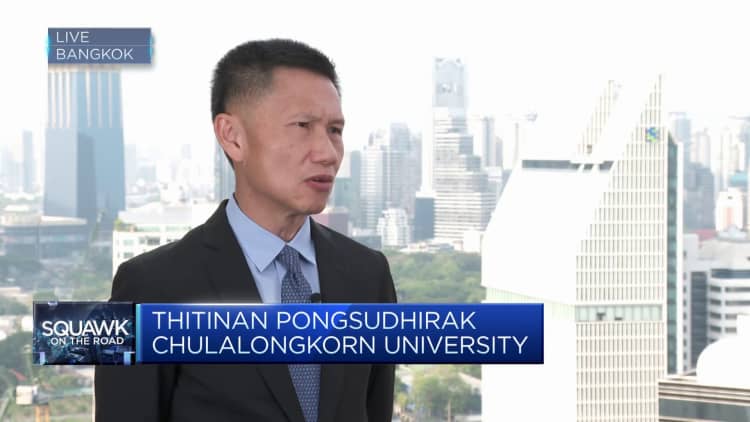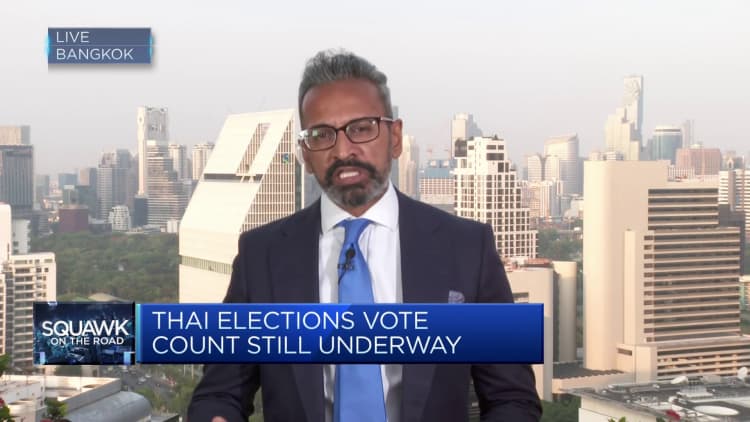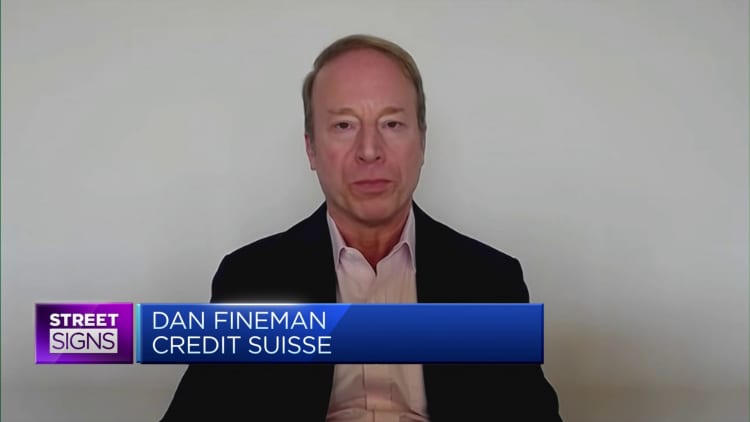Bans, betrayals and stalemates: How Thailand’s old guard could respond to election results
Pita Limjaroenrat, leader of the Move Forward Party (center), at a rally in Bangkok, Thailand, on May 18 2023.
Valeria Mongelli | Bloomberg | Getty Images
Thailand’s preliminary election results was a triumph for the progressive Move Forward party but its reforms are set to threaten conservative forces that may move to prevent the pro-democracy party from governing.
Move Forward’s leader and chosen prime ministerial candidate Pita Limjaroenrat has announced a six-party coalition that includes Pheu Thai, a populist, pro-democracy party that came second in the election.
This gives the coalition 310 seats in parliament’s 500-seat lower house. Whoever the coalition appoints as prime minister must win 376 parliamentary votes — a combined number from the 250-seat, military-appointed Senate and the lower house. The vote for PM is expected in August after the Election Commission certifies election results.
Analysts say Move Forward faces a daunting task to shore up the remaining 66 vote due to its controversial proposed policies — a new constitution, ending military dominance in politics, abolishing mandatory military conscription, abolishing business monopolies and revising the lese-majeste law that punishes insults to the king with jail time.
Move Forward’s agenda is an affront and a frontal challenge to the established centers of power.
Thitinan Pongsudhirak
professor, Chulalongkorn University
The Move Forward party recently said potential coalition partners don’t need to support its stance on lese-majeste as it plans to table it in parliament independently — its refusal to compromise could also isolate prospective allies and most of the junta-led Senate.
Ahead of the prime ministerial vote, political watchers anticipate a variety of outcomes, including the possibility of forced intervention by the country’s powerful military-monarchy alliance.
“Move Forward’s agenda is an affront and a frontal challenge to the established centers of power,” said Thitinan Pongsudhirak, a professor at Chulalongkorn University’s Faculty of Political Science and a senior fellow at its Institute of Security and International Studies.
“It is likely a matter of when and how — not whether — they will strike back.”
Establishment-led escalation
Given Move Forward’s dogmatic stance, experts expect some kind of power play that would tailor outcomes to establishment preferences.
Arch-royalists could go as far as to ban Move Forward, the Council on Foreign Relations (CFR) warned in a report.
It’s a plausible scenario since royalist-conservative elites have sway over official bodies like the Constitutional Court, National Anti-Corruption Commission and Electoral Commission. Opposition party Future Forward, for instance, was dissolved by the Constitutional Court in 2020 for violating election laws in the 2019 election — a charge that Human Rights Watch called “politically motivated.”

“The courts could find ways to nullify enough Move Forward and Pheu Thai victories to alter the balance of power,” echoed analysts at the Center for Strategic and International Studies (CSIS) in a separate report.
There’s also a chance Pita himself could be targeted.
He was recently charged with a constitutional violation for being a small shareholder of a now-defunct media company while serving as an member of parliament, which he denies. This could be potential grounds for his disqualification and enable the less-radical Pheu Thai to lead the coalition, according to Pongsudhirak.
There is a precedent for Pita’s case to be cleared, noted Napisa Waitoolkiat, a political scientist at Naresuan University.
Conservative forces have all the necessary tools at their disposal to prevent Move Forward from taking government.
Susannah Patton
Lowy Institute
In 2001, the Constitutional Court acquitted former premier Thaksin Shinawatra of concealing assets even after he was indicted for corruption charges, she said. “If the elites choose to respect the votes of Thai people, they can certainly do the same this time as they did towards Thaksin in 2001.”
There are other ways for the Senate to block Move Forward. Senators could abstain from voting and refuse to confirm Pita, leading to a stalemate, according to CSIS. T
he Senate could also countermand lower house MPs’ choice of prime minister, unless the hard-to-reach super majority of 376 votes is secured, Susannah Patton, director of the Southeast Asia Program at the Lowy Institute, said in a report. She pointed to statements from senators who hinted they won’t automatically endorse the winning party’s nominee.
“Conservative forces have all the necessary tools at their disposal to prevent Move Forward from taking government,” Patton concluded.
A Pheu Thai betrayal
Led by the daughter of ex-prime minister Thaksin, Pheu Thai is an opposition party that is more careful about its messaging on the monarchy. Analysts say there’s a chance it could break ranks with Move Forward to work with pro-military parties in order to negotiate strategic gains.
“Given Pheu Thai’s desire for power, the party leadership may see Move Forward’s progressive stances and its threat to the monarchy as a political liability,” CFR stated in its report. “If Pheu Thai abandons its pro-democracy peers in pursuit of power, the Bhumjaithai party will likely play a significant role as kingmaker in forming a coalition.”

Bhumjaithai, known for its strong support of marijuana legalization, is considered ideologically flexible as they are pro-establishment but open to working with pro-democracy outfits.
There’s one key reason Pheu Thai might abandon Move Forward, said Pongsudhirak — and that’s to “eke out a coalition deal that would include Thaksin’s return to Thailand from exile on softened conditions related to his conviction and jail term.”
Doing so, however, means long-lasting repercussions for Pheu Thai’s image.
“Pheu Thai will run the risk of being punished electorally by the pro-democracy voters, who are the key supporters of Pheu Thai in the future,” warned Waitoolkiat.
Playing the wait-and-see game
Move Forward’s clear lead in preliminary election results gives it a clear mandate to lead in the eyes of the public. Any attempts to thwart that could result in widespread protests, as history shows.
When the Future Forward Party was dissolved in 2020, it set off mass youth-led protests.
“If a prime minister is selected that is not a representative of a Move Forward-Pheu Thai alliance and instead is from pro-military parties and their allies and senators, expect major street protests,” CFR said.
In that scenario, there’s a chance the military could stage yet another coup, CSIS added. Thailand is no stranger to coups — and has experienced at least 19 coups since 1932, according to the think tank.

Having just recovered from a pandemic-triggered slump, officials may also not want street demonstrations that risk derailing investor confidence and economic growth.
“While the Thai military has been prepared to wear the risk of protest from Thailand’s rural northeast in the past, Move Forward’s commanding wins in Bangkok and other urban centers may make the military think twice,” said Patton. She referred to comments from the Thai Chamber of Commerce that indicated a desire among business groups for a stable government rather than another period of political tumult.
“The establishment may therefore judge that allowing Move Forward to take office is a smarter tactical move,” she continued. “In previous periods of instability, such as the 2014 coup, the establishment acted when it felt that all options had been exhausted.”
“This time, decision-makers may calculate that they can allow events to run their course and use legal options to act later if red lines are crossed,” Patton added.
For all the latest World News Click Here
For the latest news and updates, follow us on Google News.

